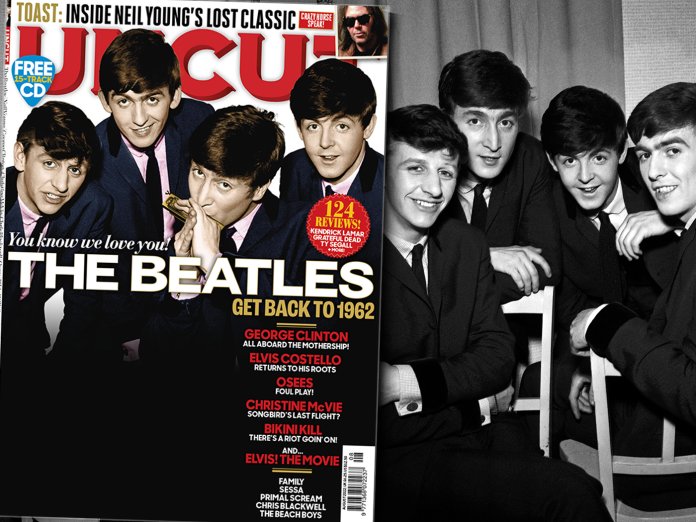JANUARY
What next from Mersey Beat’s Best Band Of 1961? “We were terrible…”
Shortly after midnight on January 1, The Beatles took to their beds at the Royal Hotel on Woburn Place. It had been a long day; the first of many in a hectic, transitional year. They’d spent December 31, 1961 travelling from Liverpool to London in Neil Aspinall’s hired van – a gruelling 10-hour trip as Neil had yet to familiarise himself with the route. When they arrived, they found the capital gripped by the coldest winter since 1887 – a chilling minus 16 degrees celsius. But the end of one year came wrapped in a beginning: on January 1, at 11am, they were booked to audition for Decca Records.
The setting for this auspicious event was Studio 2 at 165 Broadhurst Gardens in West Hampstead – the same room where Lonnie Donegan had invented skiffle with “Rock Island Line”. Those expecting similar magic on this occasion may have been disappointed. The Beatles recorded 15 songs – a representative mix of originals, rockers and standards. But the vibe? While Decca’s engineers were critical of Pete’s drumming, Paul also suffered from nerves that affected his delivery. “We were terrible… we were terrified, nervous,” recalled Lennon later. Among the set were three McCartney–Lennon originals – “Like Dreamers Do”, “Love Of The Loved” and “Hello Little Girl” – songs that would soon prove to be pivotal.
The Beatles returned to Liverpool in time for the January 4 edition of Mersey Beat, which named them the Best Band of 1961. Or were they? “I fiddled that,” admits Mersey Beat editor Bill Harry. “The group with the most votes was Rory Storm & The Hurricanes, with Ringo on drums. But it was obvious to me The Beatles were the best.” The following day brought the UK release of their debut single, “My Bonnie”. Although credited to Tony Sheridan and The Beatles, the group could now legitimately describe themselves as recording artists. Brian added the single and the Mersey Beat accolade to a growing list of accomplishments he liked to recite when booking gigs. This was all part of an increased professionalism he brought to the operation. The band were banned from smoking or swearing on stage, briefed on the importance of punctuality and politeness, and fitted for suits by tailor Walter Smith at Beno Dorn’s shop, 9a Grange Road West, Birkenhead. These were sold at a discounted fee of 23 guineas because, Brian assured the sceptical tailor, the group would soon be so famous that everybody would want a Beatles suit.
As the band performed lunchtime and evening shows at the Cavern, Epstein wrote to the BBC to request a radio audition. He also composed a press release, complete with photos, for despatch to regional newspapers ahead of shows. The band were moving beyond Liverpool into the wider North-West. Further afield, they were offered a more lucrative residency in Hamburg for April. The band weren’t eager to return to Germany, but at least they would see Stu again. Then, on January 24, Brian met the band at Pete’s parents’ house on Hayman’s Green brandishing an official management contract. It was not legally binding, though, since Paul, Pete and George were underage, while Brian himself didn’t sign it. This, he later explained, was because he wanted to give the band a way out if he couldn’t get them a record contract, an article of faith that said so much. The pressure was on, for everybody.



